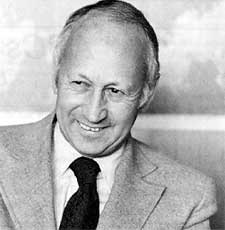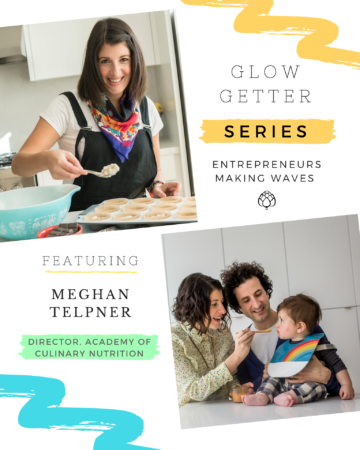
This is Norman Cousins.
As an adjunct Professor of Medical Humanities for the School of Medicine at the University of California, Norman did research on the biochemistry of human emotions.
Norman believed that our emotions are the key to fighting illness in the body.
This notion is a hugely popular field known as psychoneuroimmunology (psychology + neurology + immunology) and was one of my favourite subject areas that I came across in my studies.
It was a topic near and dear to Norman’s heart because he battled three illnesses over the course of his life: Arthritis, Heart disease, and a heart attack.
According to Norman, laughter was the key to fighting his illnesses.
Norman’s Recovery Program
He created a recovery program that involved mega doses of Vitamin C, along with a readjustment of his emotions. He made sure to hold a positive attitude even when his illnesses made life very tough. He said that he had a lot of love, faith, hope, and laughter in his life.
He even found a cure for his debilitating pain:
- Norman said that just 10 minutes of deep, belly laughter would dull his pain for at least two hours.
After 10 minutes of laughing, he found that he could fall asleep without any pain. He said, ‘When the pain-killing effect of the laughter wore off, we would switch on the motion picture projector again and not infrequently, it would lead to another pain-free interval.’
He stood by his belief that wanting to play a role in curing oneself is the essence of the motivated person.
He coined this belief as ‘hardiness’.
Hardiness is composed of 4 ingredients:
1) Positive Expectations
You expect successful outcomes for yourself and others.
2) Relaxation
You dissipate stress through appropriate methods
3) Positive Emotions
You maintain a sense of humour and joyfulness.
4) Active Role
You are a ‘doer’, not just being done unto. You believe that you are in control of your destiny and not ‘fate’.
Despite his debilitating illnesses, Norman lived a long life. At 75, Norman died of heart failure on November 30, 1990, in Los Angeles, California.
What is interesting about his story is that he survived years longer than his doctors predicted:
- 10 years after his first heart attack,
- 16 years after his collagen illness, and
- 36 years after his doctors first diagnosed his heart disease.
~~~~~
Do you think that emotions are linked to illness as Norman claims? Is laughter really the best medicine?
I personally believe that emotions are closely tied to illness.
After learning about what stress does to the body (e.g., increased cortisol, shrinkage of hippocampus, reduction of new neurons, decreased memory, etc) in my neuropsychology course, I am a firm believer that what we think has serious implications for how well or how poorly our body will function.
I think we need to start seeing stress as more than just what it does to the outside of us. For example, stress causes me to breakout and sleep poorly. It also causes me to be moody and eat junk food. Sure, these things are annoying and disruptive, but I think it is important to recognize that stress is much more pervasive than what we see on the outside.
Stress affects every cell in our body.
One of my favourite books of all time is When The Body Says No by Dr. Gabor Maté.
Dr. Maté summarizes the latest scientific findings about the role that stress and individual emotional makeup play in an array of diseases.
One of my favourite quotes in the book is:
“When we have been prevented from learning how to say no, our bodies may end up saying it for us.”
Dr. Maté sees illness as the body’s cry for help. He says when emotions are repressed, this inhibition disarms the body’s defenses against illness. And, in some people, these defenses go awry, destroying the body rather than protecting it.
It is a fascinating book. If you are interested in this topic I would highly recommend it if you are looking for a highly eye-opening read that forces you to take a hard look your own daily emotions.
~~~~~
See you this afternoon for the top ways to beat STRESS! How timely! ;)
I will also be answering your questions: Have I signed up for another race?

‘It is part of the cure to wish to be cured.’ ~Norman Cousins





That’s absolutely fascinating research! I’ve always believed that attitude plays a big part in how your immune system functions, but I’ve never seen actual research on the effects.
It works the other (negative) way too: When I was little, I woke up feeling kind of icky and tried to get my parents to keep me home from school. But I didn’t have a fever or severe enough symptoms, so my dad took me to school. As he dropped me off, he gave me a speech about mind over matter, and I should use my brain to tell my body to be healthy. Well. I was an 8-year-old who didn’t want to go to school, so I sat there for about 3 hours telling my body to get sick! Hah. It worked though; when I asked to go see the nurse, they called my parents and my dad came back to pick me up.
On a slightly related note, I’d love to read your thoughts and research about exercising and illness–when to keep working out, when to stop, and (most importantly, I think) how and when to start again after you’ve been sick. I’ve learned the hard way to wait at least 2-3 extra days after I feel normal before jumping back to hard workouts or I’m likely to relapse.
I would totally agree that emotions have some type of link to illness. I’ve noticed that unhappy people are sick and have more health concerns than those who are genuinely happy.
I absolutely believe in this idea! And that’s so interesting about laughter offering some pain relief. I know a good laugh can immediately lift my mood, but I don’t think I’ve ever personally experienced a reduction in pain from laughing.
what is oh illness??? my teachers borther in-law has it idk what it means im just in 5 grade and im 11 gosh what dose it mean ? plz write back
ps. PLZ TELL ME !!!!!!!!!!:0
Hi Angela, so I decided I was going to read through ALL your entries! (crazy, I know) But this one kind of hit home for me with a situation in my life and I thought you would love to hear it. My cousin Haley has Stage (?) cancer. Haley is 20 years old, just like me, and has had a mental disability her whole life. 3 years ago she was diagnosed with cancer. After a year of fighting tumors and chemo she was cancer free for two years! And now its back. She’s had one lung taken out plus numerous trips to the hospital this year. Heres the kicker: She’s FINE. Yes, she has cancer. But I’m tellin ya, she bounces back from everything (chemo, LUNG-sectomy!) FAST, like faster than anything I could’ve imagined. I was never more surprised when I heard she was TALKING after only a day of having her lung taken out. She went HOME after a whole week. Yes she has cancer, but she has the same energy she’s always had. And I’ve figured out why. With her mental disability, she knows nothing of what cancer can do. She doesn’t know about death or sadness, even at 20. Her whole life she knows nothing but happiness and, to be honest, she gets WHATEVER she wants ( her mom kind of babies her, especially since shes been sick) but thats my point. She gets whatever she wants, shes beyond happy. She’s healthy! I don’t think shes going anywhere anytime soon, shes just too healthy! Just a little story to go along with your post..it always reminds me “mind over matter”!!!! :) p.s have you ever looked into “The Secret” theory? it’s all about mind over matter, seeing is believing kind of stuff. look it up! ;)